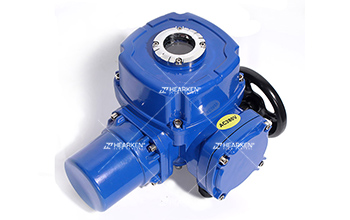Understanding the Differences Between Multi-Turn and Quarter-Turn Actuators
In this article we break down how the two actuator types work, the main differences, advantages and disadvantages to help you choose the right actuator type.
What is the difference between multi-turn and quarter turn actuators?
Multi-turn actuators rotate the valve stem multiple times for full valve operation, while quarter-turn actuators rotate only 90 degrees to control the valve.
What is the working principle of an Multi Turn electric actuator?
1. Multi Turn Electric Actuators are one of the most commonly used and reliable types of actuators driven by electric power.
2. Using a single-phase or three-phase motor to drive gears or worm gears, and finally driving the valve stem nut.
3. The valve stem nut causes the valve stem to move ,so open or close the valve.
Limit Switches for Protection:
Limit switches are installed at the end of the valve stroke to cut off motor power, preventing damage.
Torque Sensing for Safety:
A torque-sensing device cuts off motor power when safety torque is exceeded, protecting internal components.
Position Switch for Status Monitoring:
A position switch indicates the valve's open or closed status.
Manual Operation in Case of Power Failure:
Includes a handwheel mechanism with a clutch for manual operation during power failure.
Advantages:
Durable Protection: All components are housed in a single shell, offering waterproof, dustproof, and explosion-proof protection.
Advanced Functions: Integrates advanced functions, making it suitable for high-demand applications.
Reliable Performance for Large Valves: Can drive large-sized valves quickly and reliably.
Disadvantages:
Power Failure Limitation: When power fails, the valve remains in its last position, reaching a fail-safe position only with a backup power system.
Larger Size and Weight: Larger and often heavier than quarter-turn actuators, requiring more installation space.
What is part turn actuator?
Quarter-turn actuators are similar to multi-turn actuators, but their final output motion rotates only 90 degrees, achieving a quarter turn.

Hearken newer models incorporate advanced settings, diagnostic functions, and non-intrusive interfaces, enhancing usability.
Suitable for compact installations, part turn actuator provides output torque up to 800 Nm and can be equipped with batteries for fail-safe operation.
Advantages:
Space and Energy Efficiency: Compact and ideal for small-sized valves, saving space and energy.
Lower Power Consumption: Requires less power than multi-turn actuators.
Fail-Safe Operation: Battery option enables fail-safe functionality even during power outages.
Disadvantages:
Limited Application Scope: Suitable only for quarter-turn motion, making it less versatile than multi-turn actuators.
Reduced Torque Capacity: Has lower torque capacity compared to multi-turn actuators.
In addition to the above two types of electric actuators,
there are also compact electric actuators:
Compact actuators, driven by AC or DC power, compact actuators are available in two action modes: electric switch type and electric adjustment type.
Advantages:
1. Convenient energy access
2. Fast Signal Transmission & Long Transmission Distance
3. Easy centralized control
4. High Sensitivity and Accuracy
5. Easy Coordination with Electric Instruments
6. Integrates seamlessly with electric adjustment instruments.
7. Simple Installation and Wiring
Disadvantages:
1. Complex structure which can increase maintenance needs.
2. Slightly higher average failure rate compared to pneumatic options.
3. Best suited for areas with low explosion-proof requirements and no gas sources.
Choosing the right actuator can improve the efficiency, reliability and safety of your application. Contact us for more product information.





